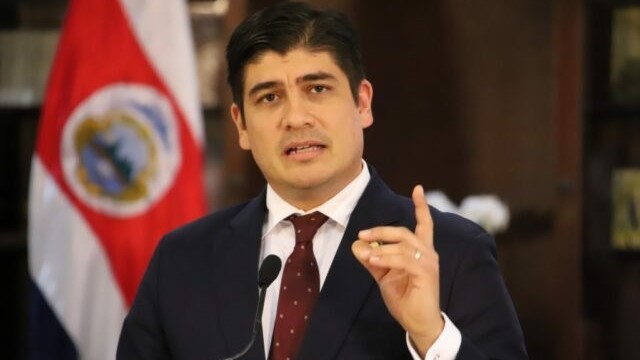World leaders are rallying support for a coordinated and coherent approach to reverse the loss of healthy land in light of the role it can play in the global efforts to recover from the COVID-19 pandemic and to deal with the crises of climate change and the loss of biological diversity.

At a virtual High-level Forum hosted Thursday, June 17, 2021, by President Carlos Alvarado Quesada of Costa Rica, high-ranking government and UN officials reinforced the perspectives shared at the High-Level Dialogue convened by the Presidency of the UN General Assembly three days earlier.
President Quesada said desertification and drought, the climate and biodiversity are all part of the same equation and need to be acted on this decade and in a decisive way. Among other measures, he stressed the need to restore ecosystems and to find and pursue new ways of production that are sustainable.
President Quesada said there is a consensus from leaders to act and several technology and nature-based solutions exist. He stressed that what is needed are the political will and finance to act, and underlined that investment in land is not an intangible investment but one that is tangible for people everywhere, even in cities.
The President organised the High-level Forum in observance of Desertification and Drought Day celebrated worldwide on June 17 every year. Costa Rica is hosting the global observance event this year.
Leaders decried the declining health of the land due to its impacts on people and nature underlined that protecting and restoring land can help drive a green recovery while preventing future pandemics.
“Humanity is waging a relentless, self-destructive war on nature….We must make peace with nature. The land can be our greatest ally. But the land is suffering,” said António Guterres, UN Secretary-General, in his message to the Forum.
“Restoring degraded land would remove carbon from the atmosphere. It would help vulnerable communities adapt to climate change. And it could generate an extra $1.4 trillion dollars in agricultural production each year. The best part is that land restoration is simple, inexpensive and accessible to all,” he added.
“Investing in nature-based solutions, specifically land restoration, will allow us to build forward better, greener, healthier, stronger and more sustainably…every dollar spent on ecosystem restoration generates seven to thirty dollars to the economy” in addition to delivering the other many benefits identified, Ibrahim Thiaw, the UN’s top adviser on the sustainable management of the land and Executive Secretary of the United Nations Convention to Combat Desertification (UNCCD), said at the Forum.
The pandemic had given us an opportunity to rethink the future we can create, he said, adding that we have the tools to succeed, to deliver and increase ambition, but only if we got the financing right – starting with COVID-19 stimulus packages – and applied the tools we have with determination, vigour and strategic vision.
President of the General Assembly Volkan Bozir said land degradation “is an issue that requires the international communities urgent and focused attention. Our ability to flourish depends on how we rebuild our relationship with nature, including the health of our land. I call on world leaders to invest in land restoration as part of post pandemic recovery strategies and to partner with stakeholders at all levels.”
Bozir thanked President Quesada for calling for a high-level alliance to raise ambition around the issue when the President spoke at the High-Level Dialogue held Monday by the Presidency of the UN General Assembly.
Ministers from Algeria, Botswana, Iceland, Peru, Republic of Korea, and Senegal also addressed the Forum.
“Restoration.Land.Recovery,”, the theme of this year’s celebrations, was chosen to drive actions to protect and restore natural ecosystems as we recover from COVID-19 by demonstrating, with Costa Rica as the prime example, that investing in healthy land as part of a green recovery can create jobs, rebuild livelihoods and insulate economies from future crises caused by climate change and nature loss, and accelerate progress on all 17 Sustainable Development Goals.
Christiana Figures, former Executive Secretary of the UN Framework Convention on Climate Change and founder of Global Optimism, who moderated the session, said humanity is at a turning point and summarised the four actions needed to reset our relationship with nature. “Reverse the losses we have incurred. Restore degraded lands. Regenerate soil, water and air. Recover productivity.”
Meanwhile, as part of the Desertification and Drought Day celebrations, UNCCD announced the winners of its prestigious Land for Life Award and, together with the UN Disaster Risk Reduction, launched the “GAR Special Report on Drought”.
An eight-member international jury declared Familial Forestry from Rajasthan, India, winner of this year’s Land for Life Award because of its innovative land restoration and conservation method that promotes the well-being of communities and improves their relationship with nature.
The jury was impressed by Familial Forestry’s achievements and how they relate a tree to the family, treating it as a green member of the family.
The award presentation will take place in August at the 8th Kubuqi International Desert Forum in China, and the winner invited to present and highlight his work and accomplishment at the UNCCD’s 15th Session of Conference of the Parties in 2022.
Global Landscapes Forum (GLF) received the Land for Life Special Mention award of the UNCCD Executive Secretary, Mr Ibrahim Thiaw, for its exceptional work as the world’s largest knowledge-led platform on sustainable and inclusive landscapes.
At the launch of the “GAR Special Report on Drought”, Executive Secretary Thiaw said the findings show that “we must act now to prevent future droughts from destroying development gains,” stressing that that no country is immune to drought and “when over 1.7 billion people already face water stress, this is a huge problem.”
The Report states that preventing drought has far lower human, financial and environmental costs than reacting and responding. A mechanism for drought management at the international and national levels could help address the complex and cascading nature of drought risk.
